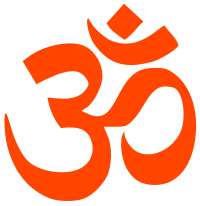Raghupati Raghava Raja Ram
Raghupati Raghav Raja Ram (sometimes called Ram Dhun) is a notable bhajan (Hindu devotional song) that was widely popularised by Mahatma Gandhi.[1] The bhajan is excerpt from Sri Nama Ramayanam by Lakshmanacharya. The most popular version of this bhajan was set to tune by the visionary Hindustani classical musician, Pandit Vishnu Digambar Paluskar.[2]
Gandhi's Version
The version that is most common was put to music by Vishnu Digambar Paluskar,[3] and was sung by Gandhi and his followers as they walked the 241-mile Salt March to Dandi.[4]
The Hindi lyrics of the bhajan along with their translation, by historian and musicologist Guy Beck, are as follows:[5]
Hindi, created by Mahatma Gandhi
- रघुपति राघव राजाराम,
- पतित पावन सीताराम
- सीताराम सीताराम,
- भज प्यारे तू सीताराम
- ईश्वर अल्लाह तेरो नाम,
- सब को सन्मति दे भगवान
- राम रहीम करीम समान
- हम सब है उनकी संतान
- सब मिला मांगे यह वरदान
- हमारा रहे मानव का ज्ञान
Transliteration (IAST):
- raghupati rāghav rājārām,
- patit pāvan sītārām
- sītārām, sītārām,
- bhaj pyāre tu sītārām
- ishwar allah tero nām
- sab ko sanmati de bhagavān
- rāma rahīm karīm samān
- hama saba hai unaki santān
- saba milā māṅge yaha varadān
- hamārā rahe mānava kā jñān
Translation:
- O Lord Rama, descendant of Raghu, Uplifter of the fallen.
- You and your beloved consort Sita are to be worshipped.
- All names of God refer to the same Supreme Being,
- O Lord, Please give peace and brotherhood to everyone,
- as we are all your children.
- We all request that this eternal wisdom of humankind prevail.
Original Version
रघुपति राघव राजाराम पतित पावन सीताराम ॥
सुंदर विग्रह मेघश्याम गंगा तुलसी शालग्राम ॥
भद्रगिरीश्वर सीताराम भगत-जनप्रिय सीताराम ॥
जानकीरमणा सीताराम जयजय राघव सीताराम ॥
रघुपति राघव राजाराम पतित पावन सीताराम ॥
रघुपति राघव राजाराम पतित पावन सीताराम ॥
- श्रीलक्ष्मणाचार्य
The excerpt given above is from the original Sanskrit version of the song which is from Lakshmanacharya's Sri Nama Ramayanam.[6][2][7]
In popular culture
Elements of the chant were included in the song "Utho Utho he Bharat" in the movie Bharat Milap (1942) [8], the song "De Dii Hamen Aazaadii" in the movie Jagriti (1954) [9], Purab Aur Paschim (1970) and in the film Kuch Kuch Hota Hai (1998), in the Kannada film Gandhinagara (1968), and in the movie Gandhi (1982). It was also the title of a Tamil movie produced in 1977. Raghupati Raghava Raja Ram has been recorded by several well-known singers. Pete Seeger included it on his album "Strangers and Cousins" (1964) and performed it in Episode 10 of his television series Rainbow Quest. The song is an important motif in the 2006 Bollywood film, Lage Raho Munna Bhai, and is featured in the movie Gandhi, My Father. The game Grand Theft Auto: Liberty City Stories featured the song on one of the radio stations Radio Del Mundo. The 2013 film Satyagraha also has a song based on 'Raghupati Raghav Raja Ram'. Rakesh Roshan's superhero film Krrish 3 contains a song named 'Raghupati Raghav'. The arrangement by Jyotishka Dasgupta is an official piece of Grade 2 Electronic Keyboard from Trinity College London, where it is simply named Bhajan. Sheila Chandra recorded a version titled Bhajan on her 1992 album Weaving My Ancestors' Voices. Many singers such as Lata Mangeshkar, Jagjit Singh, K.S.Chithra have recorded the song.
See also
- Vaishnava jana to
- Hari Tuma Haro
- Hanuman Chalisa
- Shri Ramachandra Kripalu
- Thumak Chalat Ram Chandra
- Tulsidas
References
- Dalton, Dennis (1993). Mahatma Gandhi: Nonviolent Power in Action. Columbia University Press. p. 109. ISBN 0-231-12237-3.
- Arunachalam, Param (2 October 2015). "Gandhi Jayanti: Remembering Bapuji through 5 evocative songs". DNA India. Retrieved 15 August 2020.
- Sinha, Manjari (8 August 2008). "Tuned to excellence". The Hindu. Retrieved 27 April 2009.
- "Dandi: Salt March". Lal, Vinay. University of California, Los Angeles. Retrieved 16 November 2007.
- Guy L. Beck (17 July 2006). "Hinduism and music". In Guy L. Beck (ed.). Sacred Sound: Experiencing Music in World Religions. Wilfrid Laurier University Press. p. 137. ISBN 978-0-88920-421-8.
- "On Gandhi Jayanti, remembering Mahatma's most beloved hymns — from Raghupati Raghava Raja Ram to Lead, Kindly Light - Living News , Firstpost". Firstpost. 2 October 2019. Retrieved 13 August 2020.
- सिंह, विकास (9 August 2020). "रघुपति राघव राजा राम भजन लिखित - raghupati raghav raja ram lyrics in hindi". दा इंडियन वायर (in Hindi). Retrieved 12 August 2020.
- Utho Utho He Bharat Tumhaare - उठो-उठो हे भरत तुम्हारे, retrieved 28 June 2020
- "दे दी हमें आज़ादी बिना खड्ग बिना ढाल - de dii hame.n aazaadii binaa khaD.hg binaa Dhaal / जागृति-(Jaagriti)". www.lyricsindia.net. Retrieved 28 June 2020.
Bibliography
- Dalton, Dennis (1993). Mahatma Gandhi: Nonviolent Power in Action. Columbia University Press. ISBN 0-231-12237-3.
